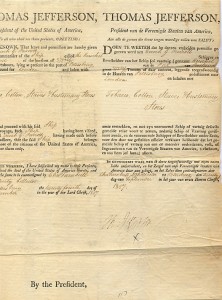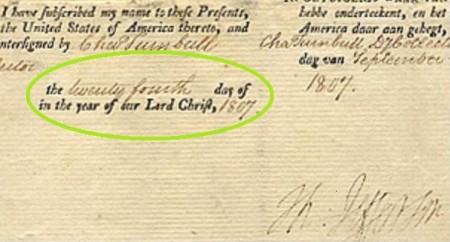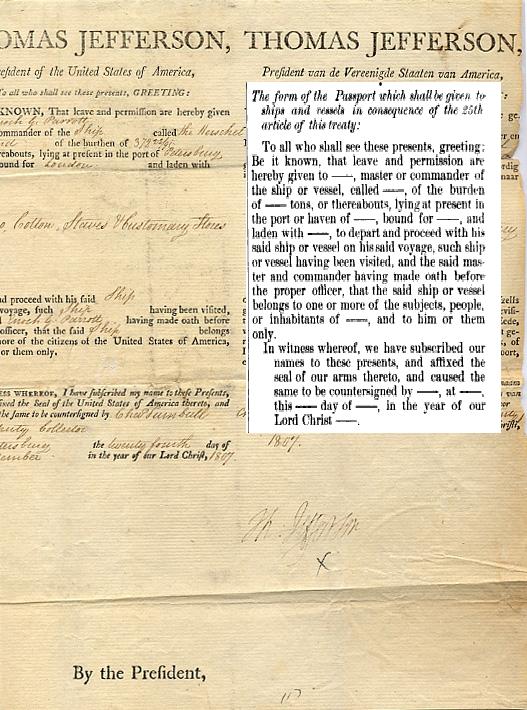Last Thursday, I wrote about my appearance on the Paul Edwards radio show, just after David Barton was on to respond to my series on Thomas Jefferson. During his time, Barton claimed that Thomas Jefferson signed an act three times “to propagate the gospel among the heathen.” Here are Barton’s exact words:
The actual quote out of all three acts was “to propagate the gospel among the heathen.” Now, when you take the context of those three federal acts, and you know, you can check the acts, March 3rd, 1803, March 19, 1805, I can give you the dates, you can look them all up and read it. It says, ‘for propagating the gospel among the heathen.’ Now this is not a territory exchange, by the way, and even if it were, let’s say the United States today makes some kind of territory exchange with the Cherokee tribe in North Carolina, or Oklahoma, what do you think happens if the federal government puts in money to pay a Catholic priest, or to build a Catholic church, even if that’s what the Cherokees want?
I demonstrated on Thursday that Congress, on June 1, 1796, provided land to Christian converts from among the Delaware tribe via a trust to a group called “The Society of United Brethren for Propagating the Gospel Among the Heathen.” Just to be clear, here is an image of the title of the bill:

Note the the 1796 bill, enacted when George Washington was President, was titled, “An Act regulating the grants of land appropriated for Military services, and for the Society of the United Brethren, for propagating the Gospel among the Heathen.” (Click the link to see the entire Act). Over a decade after the Delaware converts and the Brethren missionaries had been displaced to Northern Ohio, the Congress made arrangements for the Society of Brethren to take trust of the land on behalf of the Christian Indians. As the language of the Act makes clear the phrase “propagating the gospel among the heathen” was a part of the legal name of the responsible organization.

As I noted last Thursday, Jefferson later renewed the act for the purposes of providing new law relating to military lands, with nothing new regarding the Brethren or the Christian Indians. The Society’s name remained in the title of the Act, which is apparently where David Barton comes up with his claims about Jefferson. Once the original act was signed by Washington, the Brethren went to work trying to rebuild the mission in Eastern Ohio. Eventually, the Society ceded the land back to the federal government because the converts did not return in sufficient numbers to make the mission viable.
The narrative developed by Barton is misleading and obscures the situation. All Jefferson did was approve bills that had a religious society’s name attached to the title.
I am reviewing this again because I continue to be bothered by Barton’s appropriation of this story as evidence for his view of Christian America. This bothers me for at least two reasons. First, he does an injustice to the historical record which includes the initial Northern relocation of peaceful elements of the Delaware tribe, and the massacre at Gnadenhutten. The Christian converts were marched to Northern Ohio and left there without provisions. Then when a group returned to Gnadenhutten to find food, they were brutally killed by the Pennsylvania Militia. The Society of the Brethren had to constantly bring the horrible treatment suffered by the native people to the attention of the “Christian nation” in order for even the most basic of response, years later. Barton’s narrative misrepresents the role of federal government and minimizes the Gnadenhutten atrocity.
Second, Barton complained on the Paul Edwards program that liberals would protest if the federal government today used funds for religious purposes with Native Americans, apparently oblivious to the fact that the federal government pushed Christianity on Native American tribes until early in the 20th century. Native children were removed from their families in elementary school and sent away to boarding schools, sometimes run by church groups. They were forbidden to speak their language or follow native customs. Some recall harsh punishments if the rules were violated. Even Christian Native Americans say that the treatment was demeaning. By using the treatment of Native Americans as evidence for his vision of Christian America, Barton inadvertently demonstrates at least one peril of his construction.
Next: Did Jefferson authorize the Capitol for church services and/or order the Marine Band to act as a worship band?
Previously:
David Barton on Thomas Jefferson – United Brethren and the Christian Indians
David Barton on Thomas Jefferson – In the Year of Our Lord Christ
David Barton on Thomas Jefferson: The Kaskaskia Indians
Was the Jefferson Bible an evangelism tool?
More on Thomas Jefferson and Christianity
David Barton: Pluralism not the goal of the First Amendment
Related:
Did the First Amendment Create a Christian Nation?


